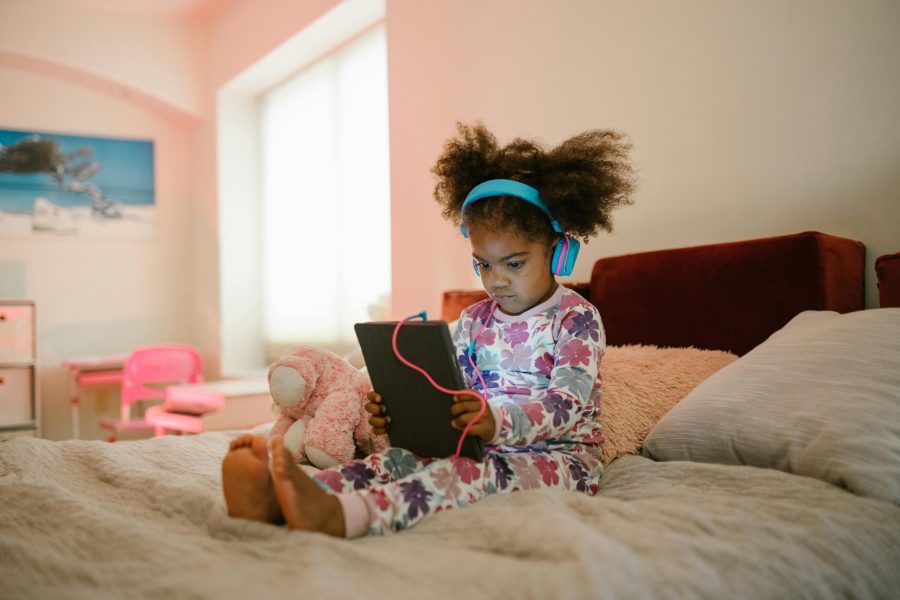Let’s be honest. Sometimes you just need ten minutes to drink a cup of tea without someone climbing on you like a human jungle gym. That’s when screens come in handy. But with all the mixed messages out there, no screens before two, limit screen time or they’ll never speak, screens are the devil, it can feel like you’re being judged just for putting on Ms Rachel so you can finish a conversation or hide in the kitchen eating biscuits in peace.
As a former lecturer in early years education, I’ve had these debates in academic settings too, and I can tell you that the research on screen time is not as clear cut as some make it sound. My own daughter had minimal screen time before two, yet she still experienced a speech delay. So what’s the real story? Let’s break it down.
The Problem With The No Screens Before Two Rule
The World Health Organization recommends that children under two avoid screens altogether. Sounds simple right Well…
Here’s the issue, a lot of the research behind this recommendation doesn’t actually consider what the child is watching or how they are engaging with it. There’s a huge difference between mindlessly staring at flashing colors and having a video call with Grandma, who is doing her best to keep a wriggly toddler entertained through the screen.
Most studies lump all screen time together, meaning an hour of Ms Rachel which actively encourages interaction is treated the same as an hour of random YouTube unboxing videos where someone dramatically reveals yet another toy your child will now demand. And let’s be honest, those are very different experiences.
The real concern is passive screen time when kids are just zoning out without any engagement. But if your child is dancing along to songs, pointing at characters, or repeating words, that’s interaction, and it’s not the same thing as staring blankly at a screen while Cocomelon plays for the hundredth time.
Screen Time And Speech Delay, What’s The Real Connection?
You’ve probably heard the claim that too much screen time causes speech delays. And yes, some studies do show a correlation. But correlation doesn’t mean causation, otherwise, I’d have to assume that every time I mop the floor, my child spills a drink because I mopped.
For example, one study found that for every thirty minute increase in daily screen time, toddlers were slightly more likely to experience delays in expressive language skills. But, and this is important, these studies don’t factor in things like genetics, exposure to conversations at home, or the fact that some kids are just more laid back and take their sweet time before they start chatting.
In my own experience, my daughter had minimal screen exposure, yet she still had a speech delay. Meanwhile, I know children who had plenty of screen time and started speaking in full sentences before they were two. The takeaway Screen time might play a role, but it’s not the only factor.
So if your child has a speech delay, don’t immediately assume it’s because of screens. There are plenty of other reasons, developmental pace, hearing issues, or even just being a second born child who doesn’t get a word in because their older sibling has a lot to say
What Screen Time Isn’t
Let’s get one thing straight, screen time is not a substitute for real world learning. Sure, kids might pick up colors or letters from their favorite shows, but they don’t need screens for that. These skills come naturally through play, conversations, and real life experiences.
And that’s, okay Not everything has to be about education. Sometimes, kids can just watch Bluey because it’s fun. And sometimes, we can just watch Bluey because it’s… well, hilarious. No shame in sitting there long after your child has wandered off, fully invested in Bandit’s latest parenting struggle. We’ve all been there.
How To Make Screen Time Work For Your Family
Instead of stressing over whether screens are bad or good, here’s how to find a balance
✔ Pick Quality Over Quantity
If they’re going to have screen time, make it count. Shows like Ms Rachel encourage interaction and language skills, unlike random unboxing videos that just hypnotize them into wanting more stuff.
✔ Set Boundaries That Work for You
No screens at mealtimes, Only after outdoor play, Figure out what fits your routine.
✔ Balance It Out
If they’ve had some screen time, follow it up with real world play. Maybe they watch a show about cooking and then help stir the batter in the kitchen.
For more ideas, check out our article on 20 Fun and Easy Art and Craft Activities for Kids
✔ Consider Screen Free Alternatives
If you’re looking for screen free ways to keep your child entertained, an audio player like the Yoto Player or Toniebox can be a great alternative. These let kids listen to stories, music, and educational content without needing a screen.
✔ Use a Child Friendly Tablet If Needed
If you do choose to introduce a tablet, a child friendly option like the Amazon Fire Kids Tablet is a much better choice than a regular tablet with free access to everything. These come with pre loaded games and built in parental controls to keep content safe.
✔ No Screens Before Bed
The blue light can mess with sleep. If bedtime is a battle, consider swapping screens for a Yoto Player or a bedtime story projector.
✔ Bigger Screens Are Better
If your child is watching something, a larger screen like a TV is better than a tablet, and a tablet is better than a phone. Sitting further away from a bigger screen reduces eye strain and overstimulation.
✔ Be Guilt Free About It
You’re not a bad parent if your child watches TV. You’re also not a hero if they never do. The goal is balance, not perfection.
Final Thoughts
Screens are part of modern childhood. Used mindfully, they’re not harmful, and they certainly don’t doom children to speech delays or developmental struggles. The key is moderation and making sure screens don’t replace real world interactions.
So if your child watches a little too much Bluey one day, don’t panic. Just make sure they also get plenty of play, conversation, and movement in their daily routine.
Now, go enjoy that cup of tea while the tablet works its magic, you’ve earned it.





